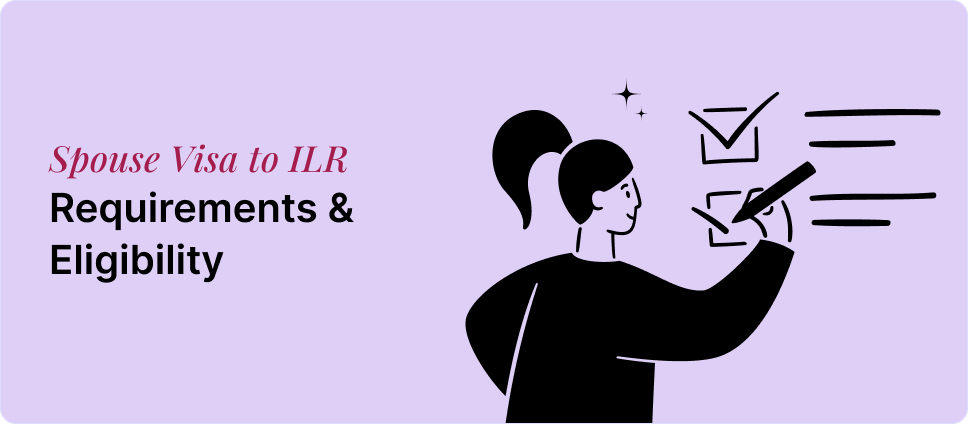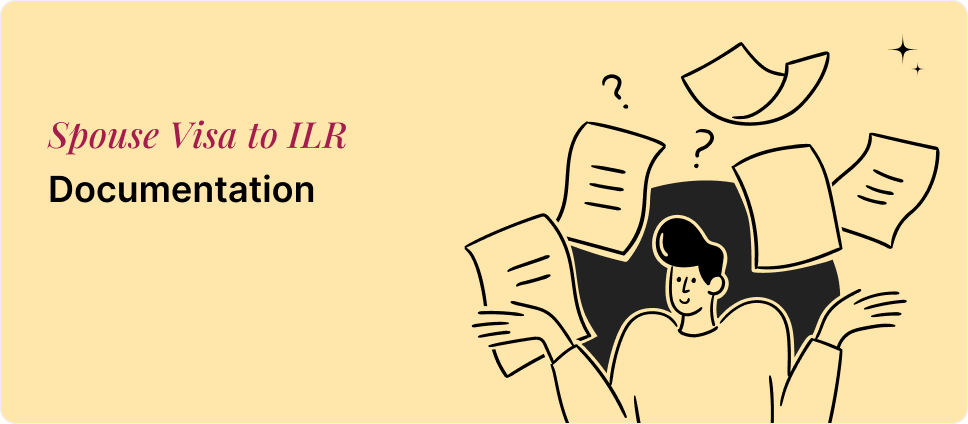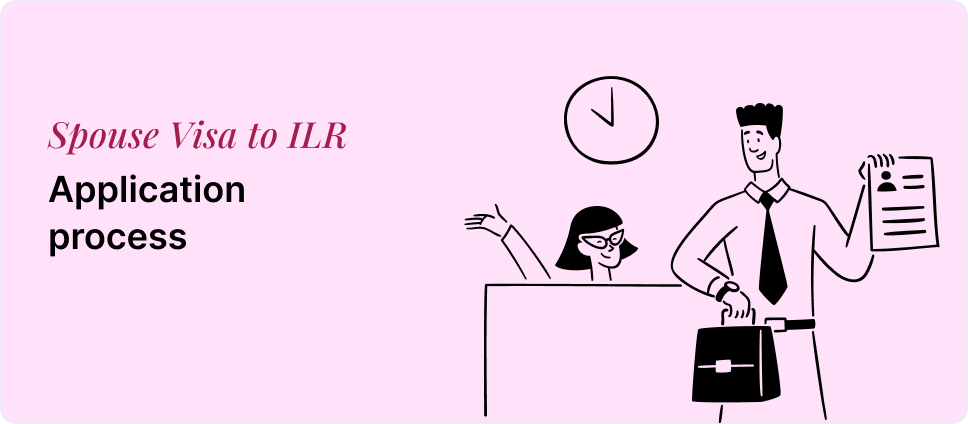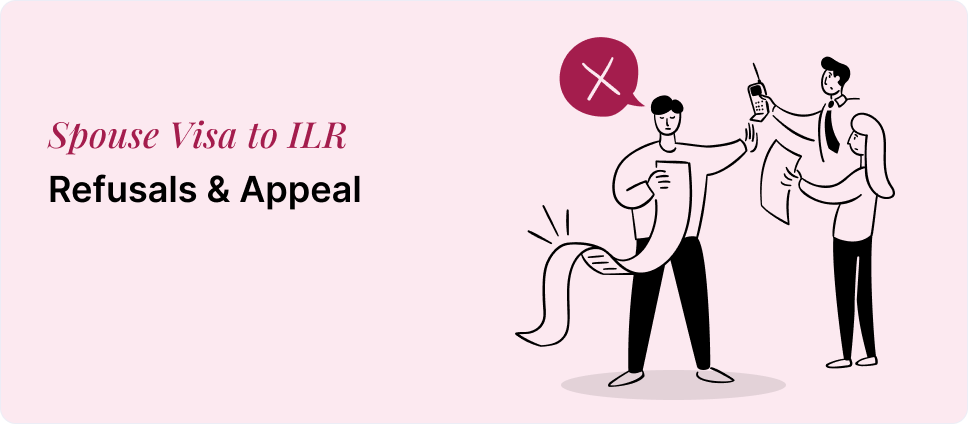Key Takeaways
Spouses of UK residents can transition to Indefinite Leave to Remain (ILR) through 5-year or 10-year routes, depending on their specific circumstances and relationship status.
Applicants must have lived in the UK with their partner, who is a British citizen or has settled status, for a continuous 60 months. They must also meet financial requirements, demonstrate adequate accommodation, and pass the "Life in the UK" test and English language proficiency tests.
As of April 2024, the combined income requirement for ILR applicants and their partners is £29,000 per year, which can include various income sources such as employment, savings, pensions, and non-employment income.
The ILR application involves submitting comprehensive documents, including proof of identity, financial evidence, accommodation details, and relationship documentation. The standard fee is £2,404, with additional costs for priority processing services.
Services
Expert Assistance for Spouse Visa to ILR
Spouse Visa to ILR Consultation
Get personalised visa guidance tailored to your unique circumstances.
Spouse Visa to ILR Applications
Maximise the chance of a successful outcome with expert help in preparing and submitting your application.
Fast-track Services
We offer fast-track services for urgent cases to accelerate the submission and decision process.
Appeal Spouse Visa to ILR Refusal
We assist with appeals and reviews to give your Spouse Visa to ILR application the best chance of success after a refusal.
Table of contents
What is a Spouse Visa to ILR
Spouse Visa to ILR (Indefinite Leave to Remain) is transitioning from a UK spouse visa to permanent residency without restrictions after living in the UK for a specified period.
There are both 5-year and 10-year routes for transitioning from a Spouse Visa to ILR in the UK for people in a genuine and subsisting relationship with a British citizen or settled partner.
The application process for transitioning from a spouse visa to ILR differs from the standard ILR application because you are applying as the partner of a UK resident. There are slightly different requirements, such as additional documentation and financial criteria.
Visa Pathway
Obtaining Indefinite Leave to Remain (ILR) can lead to British citizenship. The timeline for applying for citizenship depends on your marital status:
- Spouse or Civil Partner is a British citizen: You can apply for British citizenship immediately after obtaining ILR, provided you meet the other requirements, such as continuous residence and good character.
- Spouse or Civil Partner is not a British citizen: You must hold ILR for at least one year before you can apply for citizenship. Additionally, you must not have spent more than 90 days outside the UK in the year preceding your application.
This pathway is subject to you applying and fulfilling other criteria, such as demonstrating good character and proving your knowledge of English by passing an accredited language exam.
Requirements & Eligibility

Residence Requirements for ILR
To qualify for Indefinite Leave to Remain (ILR), you need to have lived in the UK with a partner who is a British citizen or has settled status for 60 months continuously.
This means you should be on a spouse visa for five years before you can apply for ILR. The time starts from your initial spouse visa grant, typically for two and a half years, followed by an extension for another two and a half years.
Your partner must be a British citizen or have a settled status like ILR. You must be able to provide evidence of continuous cohabitation and a "subsisting relationship" since your last visa renewal. It’s about living under the same roof and sharing a life together. When you are ready to apply for indefinite leave to remain, the spouse visa ILR application will assess these factors to determine your eligibility.
Eligibility and Exclusions:
The time spent in the UK on different visa types or as an engaged partner (fiancé(e) or proposed civil partner) does not count towards this five-year requirement. Only the time spent on a UK spouse visa is considered.
It is not possible to combine the time spent with two different partners. Any leave granted on the basis of a previous partner cannot be added to the current leave for the purpose of accruing the relevant five years.
Proving Your Residence:
You need to prove to the Home Office that you have continuously lived in the UK for 5 or 10 years, depending on your immigration route.
There is no specific absence threshold to meet for ILR as a family member, but you must demonstrate your intention to live with your partner in the UK.
If you have spent extended periods outside the UK, you should show that these absences were for valid reasons and that you still intend to live with your partner in the UK.
Allowable Absences:
Absences should be for good reason and consistent with the intention to live together permanently in the UK. Limited periods outside the UK, such as holidays, short business trips, or periods overseas in connection with your work or that of your partner, are generally acceptable.
Unlike other immigration categories that limit absences to 180 days in any 12 months, the spouse visa category does not have a maximum allowance for absences. However, frequent or extended absences suggest you do not intend to live permanently with your spouse or civil partner.
Absences should be documented and kept to a minimum to avoid complications. The Home Office will decide on each case on its merits. Consistency in residence and the intention to live permanently in the UK are crucial to meeting the residence requirements for ILR.
Financial Requirements

To fulfil the financial requirements, you must demonstrate that you can independently support yourself and your family. This area is complex; therefore, it is important to plan how your application will be structured well ahead of time to meet the financial requirements effectively.
As of April 2024, you and your partner must have a combined income of at least £29,000 a year to obtain leave to remain in the UK on a Spouse Visa. This threshold can be met through various sources, including:
- Income from salaried employment and self-employment.
- Cash savings over £16,000 up to £88,500 held for at least six months.
- Non-employment income is income from property rental, investments, shares, and stocks.
- Money from a state, occupational, or private pension in the applicant's or partner's name.
- Maternity allowances or other benefits received in the UK.
Income Sources
You can include various sources of income, such as:
- Employment income before tax and National Insurance (check your P60 or payslips).
- Income from self-employment or as a director of a limited company (check your Self Assessment tax return).
- Money from a pension.
- Non-work income, such as from property rentals or dividends.
Combining some sources of income is not allowed, such as combining self-employment income with cash savings.
Calculating Savings
When using savings toward the financial requirement, any amount over £16,000 can be divided by 2.5 and deducted from the required threshold for initial and extension applications. For ILR applications, all savings above £16,000 held for six months or more can be used without division.
Dependent Children
You must include all your dependent children under 18, even if they are not added to your application. If you have one dependent child, you need to show an additional gross annual income of £3,800.
A further £2,400 is required for each subsequent child. For example, if you have two children in addition to your spouse, the total income threshold is £24,800.
Exceptions
Specific exceptions to the minimum income threshold apply, such as if your partner receives disability-related benefits or you have other income sources. In these cases, you must prove that you can maintain yourselves without public funds.
Suppose your spouse or civil partner receives specific welfare benefits like Attendance Allowance. In that case, you only need to show you can adequately maintain yourselves and any dependents without public funds, ensuring you have enough funds for housing and support.
Adequate Accommodation Requirement
When applying for Spouse Visa ILR, you must demonstrate that you and your partner have "adequate accommodation" in the UK, which meets the standards set by the UK government.
Adequate Space: Your accommodation must have enough space for you, your partner, and any dependents. If applicable, there should be separate bedrooms for adults and children over 10 years old.
Safety Standards: Your accommodation must be safe and not pose any risks to health or well-being. This includes adhering to fire, gas, and electrical safety standards.
Condition of Property: Your accommodation must be in good repair, with no major defects. It should be structurally sound, free from damp, and fit for human habitation.
Indefinite Contract or Ownership: If you rent your accommodation, you must have an indefinite tenancy agreement, or your landlord must confirm that they have no objection to you continuing to live in the property. If you own your property, you must provide evidence of ownership through documents such as land registry papers or a mortgage statement.
Exclusive Occupation: The property can be owned, rented, or even part of a shared living arrangement if you have an exclusive occupation. This means a specific part of the property is reserved for your use.
If you are applying for a Spouse Visa ILR based on a child who is already settled in the UK, you do not need to meet the accommodation requirements separately.
Knowledge of Life in the UK (KoLL)
It is necessary to showcase your understanding of life in the UK. To do this, you must:
Pass the “Life in the UK” Test
- The Life in the UK test assesses your knowledge of British customs, history, and traditions. It demonstrates your commitment to integrating into British society.
- Unless you are exempt, you will need to take this test at an approved test centre. Exemptions include individuals under 18, over 65, or people with a physical or mental condition that prevents them from meeting this requirement.
Meet the B1 CEFR Level for English Language Proficiency:
- This can be achieved by passing an approved Secure English Language Test (SELT) in speaking and listening. Approved tests include the Integrated Skill in English test, Graded Examinations in Spoken English, IELTS Life Skills certificate, and IELTS certificate.
Proof of Meeting the English Requirement:
- You must provide evidence, such as a certificate from an English language test you have taken with a certified provider or a degree taught in English.
Exemptions from the English Language Requirement:
- You will not need to meet the English language requirement if you are from a majority English-speaking country.
Nationals Exempt from UK Language Requirement

Antigua and Barbuda

Australia

Bahamas

Barbados

Belize

British Overseas Territories

Canada

Dominica

Grenada

Guyana

Jamaica

Malta

New Zealand

St Kitts and Nevis

St Lucia

St Vincent and the Grenadines

Trinidad and Tobago

USA
- You can also satisfy the requirement if you hold a degree that was taught or researched in English and is recognised as equivalent to a UK bachelor’s degree or higher.
Documentation

When applying for an ILR spouse visa, you need to provide a wide range of documents to prove your identity, relationship, and eligibility. All documentation needs to be provided in the correct format, and certified translations need to be provided for any documents that are not in English or Welsh. The documentation requirements include:
- Identity and Immigration Status:
- Current valid passport or other travel document.
- Previous passports or travel documents used during your stay in the UK.
- Biometric residence permit (if you have one).
- Spouse or Partner’s Documentation:
- Your spouse or partner’s passport or travel document showing they are present and settled in the UK.
- Evidence of Relationship and Cohabitation:
- A certified copy of your marriage certificate.
- Recent statements showing joint accounts or direct debits.
- Letters or emails are addressed to both of you at the same address.
- Bills showing both your names at the same address.
- Documents showing shared tenancy, mortgage, or a letter from your landlord.
- Financial Documentation:
- Bank statements.
- Wage slips.
- Job contracts that include salary.
- P45/P60 forms.
- English Language Requirement:
- Proof of passing an English language test (e.g., IELTS certificate).
- A degree taught or researched in English.
- Life in the UK Test:
- A pass certificate for the 'Life in the UK' test taken at a registered centre.
- Proof of Absences from the UK:
- Letters from employers or travel documents for any holidays taken.
- Dependents’ Documentation (if applicable):
- Passports or travel documents for dependents.
- Birth or adoption certificates.
- Evidence of residence and upbringing (e.g., school letters, medical records).
- Accommodation Details:
- Shared tenancy agreements.
- Mortgage statements.
- Proof of shared rent payments.
- Details of your accommodation, including the number and use of rooms.
- Additional Evidence:
- Details of any previous immigration applications you’ve made.
- Details of any criminal convictions.
- Your national insurance number.
- Tuberculosis test results if required.
When to Apply
You can apply for ILR up to 28 days before completing the required 60-month period on your spouse's visa. Submitting your application within this window ensures you meet the residence requirements without overstaying your current visa.
Applying before your visa expires is essential to avoid complications such as potential deportation or overstaying penalties. Applying in good time also means you can remain in the UK while awaiting the decision on your ILR application. However, applying too early or late can lead to rejection or categorization as an overstayer.
If you do overstay, your ILR application may be refused. In specific limited situations, a brief period of overstaying might be disregarded if you apply within 14 days after your previous leave expires and can provide a valid reason beyond your control for the delay.
Processing Times
An Indefinite Leave to Remain (ILR) application can take up to six months to process. However, some applications, exceptionally straightforward cases, can receive a decision faster.
This timeframe can extend to six months or longer, especially in complex cases involving requests for exceptions on compassionate grounds or a history of criminal or immigration violations. If supporting documents need verification or if you are required to attend an interview, it is crucial to respond promptly to any requests from the UKVI to avoid further delays or potential rejection of your application.
While awaiting a decision, you can stay in the UK if your application is submitted on time.
Priority ILR Processing
If you wish to expedite your application, there are premium processing options available:
- Priority Service: This service costs an additional £500 on top of the ILR application fee and aims to provide a decision within five working days.
- Super Priority Service: This service costs an additional £1000. The super-priority service typically delivers a decision by the end of the next working day after your appointment, as long as the appointment is on a weekday.
Cost
When submitting an ILR application as a spouse, the fees are as follows:
- Standard Fee: £2,885 per applicant.
- Life in the UK Test: £50. (non-refundable if you fail the test)
For faster processing, you can opt for additional services:
- Priority Service: £500. (decision within 5 working days)
- Super Priority Service: £1,000 (next working day decision after your appointment)
Please note that refunds will only be provided for any of the fees if your ILR application is accepted.
Apply for ILR as a Spouse

The process of applying for Indefinite Leave to Remain (ILR) after holding a spouse visa is as follows:
Step 1: Eligibility Check
- Ensure you have lived in the UK on a spouse visa for 5 continuous years (60 months) or meet the criteria for the 10-year route, and confirm your relationship is genuine and subsisting.
Step 2: Gather Required Documents
- Collect necessary documents such as valid passports, evidence of cohabitation, financial evidence, proof of accommodation, English language proficiency, Life in the UK test certificate, and documentation supporting any absences from the UK.
Step 3: Complete the Application Form
- Fill out the online Form SET(M) for ILR applications based on a spouse visa.
Step 4: Pay the Application Fee
- Pay the current fee of £2,885 for a single applicant, with additional fees for dependents.
Step 5: Submit Biometrics
- Book and attend an appointment to provide biometric information (fingerprints and a digital photograph).
Step 6: Submit the Application
- Submit the completed application form, pay the fee, and upload or send your supporting documents as required.
Step 7: Wait for a Decision
- Wait for a decision, with standard processing times around 6 months and priority services available for faster processing.
Step 8: Post-Application
- If successful, you will receive ILR, which will allow you to live and work in the UK indefinitely and put you on the path to British citizenship.
Additional Considerations
- The Home Office will assess your criminal and immigration history, and any unspent convictions or significant breaches of immigration rules may jeopardize your application.
How to Apply for ILR as a Spouse
The process of applying for Indefinite Leave to Remain (ILR) after holding a spouse visa is as follows:
Eligibility Check
Ensure you have lived in the UK on a spouse visa for 5 continuous years (60 months) or meet the criteria for the 10-year route, and confirm your relationship is genuine and subsisting.
Gather Required Documents
Collect necessary documents such as valid passports, evidence of cohabitation, financial evidence, proof of accommodation, English language proficiency, Life in the UK test certificate, and documentation supporting any absences from the UK.
Complete the Application Form
Fill out the online Form SET(M) for ILR applications based on a spouse visa.
Pay the Application Fee
Pay the current fee of £2,885 for a single applicant, with additional fees for dependents.
Submit Biometrics
Book and attend an appointment to provide biometric information (fingerprints and a digital photograph).
Submit the Application
Submit the completed application form, pay the fee, and upload or send your supporting documents as required.
Wait for a Decision
Wait for a decision, with standard processing times around 6 months and priority services available for faster processing.
Post-Application
If successful, you will receive ILR, which will allow you to live and work in the UK indefinitely and put you on the path to British citizenship.
Considerations After ILR Approval
If you receive an ILR approval, you can travel and re-enter the UK without any immigration constraints. However, if you leave the UK for more than two years continuously, your ILR status will lapse, which means you would need to apply for a Returning Resident visa to regain your ILR status.
If you plan to be away from the UK for an extended period, it is crucial to understand the implications of your ILR status. For absences longer than two years, you must apply for entry clearance at a British Diplomatic Post before returning to settle in the UK.
Spouse Visa to ILR Application Refusal

Common Reasons for ILR Refusal
- Any period of overstaying, even for one day, when applying under the 10-year continuous lawful residence rule can lead to refusal.
- Refusal can occur if you haven't lived with your spouse for the required 5-year period or if there are allegations that the marriage was for immigration purposes.
- Failure to pass the English language test or the Life in the UK Test to the required standard can result in refusal.
- Criminal convictions or being deemed a person of bad character can result in refusal.
- Issues related to your role as a spouse or carer under Appendix FM can lead to refusal.
- Using the wrong application form, such as SET (O) instead of SET (M), can result in refusal, though it may be appealed if no fee issues are involved.
- Not meeting income thresholds, unpaid NHS surcharges, or outstanding court costs can all lead to refusal.
Next Steps After Refusal
If your application for Indefinite Leave to Remain (ILR) as a spouse is refused, several options are available for moving forward.
- Administrative Review:
- If you believe there was a mistake in the refusal, you can request an administrative review within 14 days if you are in the UK or 28 days outside the UK. This review costs £80 and involves a detailed review of your application for errors.
- Appeal the Decision:
- If granted the right to appeal, you can challenge the refusal on grounds of human rights or other legal standings. The deadline for filing an appeal is 14 days from receiving the decision letter if you are in the UK or 28 days if you are outside the UK.
- Re-apply for ILR:
- If your application was refused due to errors, you can correct and resubmit it. It is highly advisable to consult an immigration lawyer to review your new application.
- Judicial Review:
- As a last resort, if you believe the refusal is legally incorrect, you can request a judicial review. This process is complex and requires legal expertise to navigate.
QC Immigration can offer expert guidance to help you address the reasons for your refusal and support you in making a solid case for your application or appeal.
Legal Assistance for Spouse to ILR Applications
UK Indefinite Leave to Remain applications require careful planning, extensive documentation, and precise timing. Preparing for your application involves understanding Home Office procedures, ensuring your application is timely, and compiling a comprehensive submission. Mistakes in any of these areas can lead to a refused application.
QC Immigration can alleviate the stress and complexity of this process. Having assisted thousands of individuals in securing their status in the UK, we offer the following services:
- Ensure you meet all requirements before applying.
- Guide you through each step of the process.
- Provide expert advice on unique or challenging situations.
- Assist with correctly including dependents in your application.
- Clarify any exemptions or the impact of individual circumstances.
Author

Qiyin Chuah
Founder & Principal
Qiyin is a globally-recognised immigration law expert:
- Hong Kong iMoney Magazine interview on Business Immigration from High Net Worth Individuals (HNWI), 2016
- ITV News interview about the Tier 2 Work Visa quota and NHS staff shortages, 2018
- The LegalTech Book: The Legal Technology Handbook for Investors, Entrepreneurs and FinTech Visionaries on the subject of ‘Humanise with Lawtech Lawyering’ (publisher: Wiley, 2020)
- Goldman Sachs 10,000 Small Businesses UK National cohort alumni, 2021
Qiyin is an industry expert with more than 15 years of legal experience. She graduated from the University of Manchester with an LL.B (Hons) in Law and an LLM in International Business Law. Initially trained in Corporate Law, she was inspired to pursue Immigration Law following a personal Visa experience. In 2011, Qiyin founded QC Immigration from frustration of the quality of client service in the market, plus the desire to build a healthier company culture. As a highly-skilled migrant herself, Qiyin fully understands the complicated circumstances and high expectations of our clients. She has proven victories in defending our clients’ businesses, children’s best interests, women’s rights, LGBT rights and challenging Home Office refusals. Our returning clients typically stay with us for over 6 years from obtaining their very first visa until British citizenship. Qiyin regularly provides mentoring, training and supervision to other lawyers in their pursuit for similar successes.